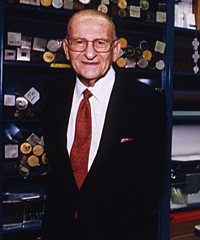 W. HARRY FEINSTONE, SPH 1939 (Sc.D.), who passed away in 2008, was a pharmaceutical researcher and executive who resided in Memphis, Tennessee. Early in his career, he developed many sulfa drugs, hailed as the first “miracle drugs” of the 20th century that are still in use today. In all, he worked for about 30 companies, receiving royalties wherever his products were made and sold. After retiring in 1976, he began a second career as the first distinguished research professor at the University of Memphis, where he worked until 1993. In 1996, Hopkins’ School of Public Health named its Department of Molecular Microbiology and Immunology in honor of Dr. Feinstone.
W. HARRY FEINSTONE, SPH 1939 (Sc.D.), who passed away in 2008, was a pharmaceutical researcher and executive who resided in Memphis, Tennessee. Early in his career, he developed many sulfa drugs, hailed as the first “miracle drugs” of the 20th century that are still in use today. In all, he worked for about 30 companies, receiving royalties wherever his products were made and sold. After retiring in 1976, he began a second career as the first distinguished research professor at the University of Memphis, where he worked until 1993. In 1996, Hopkins’ School of Public Health named its Department of Molecular Microbiology and Immunology in honor of Dr. Feinstone.
Feinstone Assistant Professorship in Molecular Microbiology and Immunology
Bloomberg School of Public Health
Microbiology & Immunology
Established in 1997 by W. Harry Feinstone
Held by Jotham Suez
 JOTHAM SUEZ, M.Sc., Ph.D., is the inaugural Feinstone Assistant Professor in the W. Harry Feinstone Department of Molecular Microbiology and Immunology. Dr. Suez’s research includes a seminal paradigm-shifting discovery related to the effects of non-caloric artificial sweeteners on the gut microbiome, thereby leading to impacts on obesity and the metabolic syndrome. In this ground-breaking project, he has been the major driving force in performing multiple in-vitro and in-vivo experiments as well as human studies in a rapid and high-quality manner. Dr. Suez’s discoveries are considered transformative to both basic science and human health and have been reproduced by dozens of follow up papers. Dr. Suez research aims to understand how the interaction between gut microorganisms and the environment can be harnessed for promoting precision medicine. In addition to identifying the individualized effects of non-caloric sweeteners on human health, Dr. Suez demonstrated microbiome-mediated, person-specific colonization resistance to common probiotics. Furthermore, his work in humans and mice surprisingly demonstrated that following antibiotics, probiotics delay, rather than facilitate, the recovery of the gut microbiome. Dr. Suez’s findings highlight the importance of considering the microbiome to improve the efficacy and safety of common therapeutics.
JOTHAM SUEZ, M.Sc., Ph.D., is the inaugural Feinstone Assistant Professor in the W. Harry Feinstone Department of Molecular Microbiology and Immunology. Dr. Suez’s research includes a seminal paradigm-shifting discovery related to the effects of non-caloric artificial sweeteners on the gut microbiome, thereby leading to impacts on obesity and the metabolic syndrome. In this ground-breaking project, he has been the major driving force in performing multiple in-vitro and in-vivo experiments as well as human studies in a rapid and high-quality manner. Dr. Suez’s discoveries are considered transformative to both basic science and human health and have been reproduced by dozens of follow up papers. Dr. Suez research aims to understand how the interaction between gut microorganisms and the environment can be harnessed for promoting precision medicine. In addition to identifying the individualized effects of non-caloric sweeteners on human health, Dr. Suez demonstrated microbiome-mediated, person-specific colonization resistance to common probiotics. Furthermore, his work in humans and mice surprisingly demonstrated that following antibiotics, probiotics delay, rather than facilitate, the recovery of the gut microbiome. Dr. Suez’s findings highlight the importance of considering the microbiome to improve the efficacy and safety of common therapeutics.
Dr. Suez received his M.Sc. in Clinical Microbiology & Immunology from Tel Aviv University in 2012, and his Ph.D. in Immunology from Weizmann Institute of Science in 2018. In 2020, Dr. Suez received the NIH Director’s Early Independence Award.